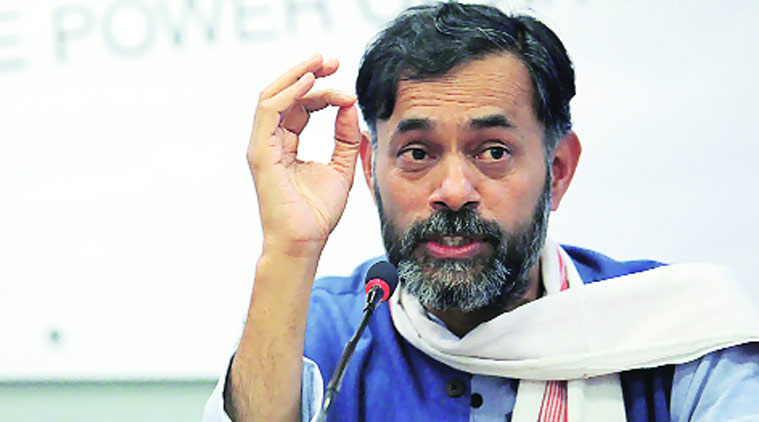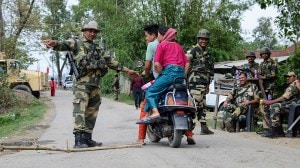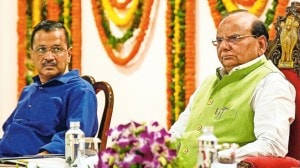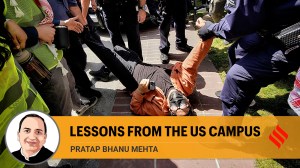- India
- International
Delhi people are tired of intervention where AAP, BJP play roles by turn: Yogendra Yadav
"Our first challenge is to set out a vision for the future of India. Today, there is no political party that even claims to offer a vision for the next 10 years, let alone the next 50 or 100 years," says Yogendra Yadav.
 Swaraj Abhiyaan founder Yogendra Yadav. (Source: File photo)
Swaraj Abhiyaan founder Yogendra Yadav. (Source: File photo)
A year after being expelled from the Aam Aadmi Party for alleged anti-party activities, Yogendra Yadav along with former party colleague Prashant Bhushan, announced the launch of a new political party, Swaraj India on October 2. Soon after their expulsion from the AAP, the duo had founded a non-electoral campaign body Swaraj Abhiyan that attracted several members from AAP, including two out of its four sitting MPs from Punjab, one sitting MLA from Delhi and some key AAP functionaries.
WATCH VIDEO: Fissures Remain Within Samajwadi Party: All You Need To Know
In the last one year, Yadav has traversed the length and breadth of the country, crusading for drought-hit farmers in Marathwada and Bundelkhand, agitated against the Arvind Kejriwal government over the Jan Lokpal Bill and more recently over its excise policy. The psephologist, academic and now president of the fledgling political party, Yadav speaks to Sweta Dutta:
What prompted the transformation of the socio-political group into this new political party?
In a sense the formation of this proposed party is a fulfilment of the promise held out by the anti-corruption movement. When the original announcement of the formation of a political party, which turned out to be the Aam Aadmi Party, was made, the initial statement which I had drafted clearly said that this new party shall express the energy of people’s movements in the last three decades. Ever since the 1980s political parties in our country have become stilted, ossified and much of the energy has come via social movements. These could be ecological movements, movements for right to food, right to education, right to information. And we had said then that this new party would be a bridge for transferring that energy from social movements to mainstream politics. For various reasons, AAP failed to do so, even before its famous electoral victories. That remains a historic task still and if I was asked to describe it in one word the party we propose to launch today seeks to fulfil that historic responsibility of converting ideas, energies, unleashed by people’s movements in the last three decades into a viable force in mainstream politics. It is very often assumed that if Prashant Bhushan, Anand Kumar and Yogendra Yadav are into formation of a new party it must be vis-à-vis the AAP. Very often the media describes as the splinter faction of AAP. I understand why they say so but in our minds nothing can be farther from truth. We are responding to a larger situation. AAP happens to be a tiny slice of that situation. We are responding to a need and a possibility. The need arises from the challenge to the very idea of India that the country faces today, specially in the last two years, since Mr. Modi’s victory. And we respond to an opportunity created by anti-corruption upsurge that brought in thousands of activists into public political life. Responding to that larger historic challenge and doing justice to this newly emergent energy is what we are focusing on. Everything else is a distraction.
WATCH VIDEO

What will your priorities be when you start out now?
Our first challenge is to set out a vision for the future of India. Today, there is no political party that even claims to offer a vision for the next 10 years, let alone the next 50 or 100 years, of how this country or this world should look like in the future. Most political parties have nothing except knee-jerk populist responses. Those who claim to be ideological happen to carry fossils of 19th and 20th century ideologies. We have already begun doing so by releasing our vision document in the public domain, putting it up for discussion, where we discuss every question from political reform to agrarian reform from education to foreign policy. Another challenge is to think of an organisational form that does not carry the deformities of the institution called political party. Political party is nothing but an election machine geared towards electoral success at all costs involved in inventing social divisions bent upon defending all the ills within, far from serving people, political party has become a self serving instrument. There is a need to think of a new organizational form which is democratic from within, open and accessible to the world outside, capable of reflecting on the weaknesses and ills within. An organisation which is transparent, responsive and accountable. In the Indian context, there is a special need to reflect the social and political diversities of the country within the new organization. The challenge for us is to think of a party which is federal in its constitution, a party that not merely respects the view of state units but which is also willing to look at autonomous political organizations within the party. Our third challenge is to make this entity politically/electorally viable. This would be attracting citizens, especially the youth to this new politics. I can think of many other challenges but I guess this is already a lifetime’s task.
If you had to implement the Delhi budget how would you use it?
I do not think of India in the prism of Delhi. Delhi happens to be a very unusual case is of a city state, where the government is more than a municipality but less than a state. This is what the constitution says and this is irrespective of what anyone might believe, irrespective of what the CM or LG might think. It may not be fair to operationalize a new idea of India through the prism of Delhi. It may be better to think of the central government to understand what a new vision will translate into. I say this because Delhi has no agricultural budget. The challenges that rest of India faces which still is majority rural is not the challenge of Delhi.
So what is your larger proposition for the country?
The very first challenge is to rethink agrarian policy. Agriculture has suffered both from lack of attention, lack of political will and from ill-advised flat-footed policies. Top priority of the government today should be to think of an agriculture policy that would make farming a viable activity. This would mean rethinking pricing policy of agriculture commodities. Perhaps we should think of income policy rather than price. There is also a need to rethink the entire subsidy regime which has diverted the subsidies, industries and poisoning our fields perhaps it is time to think of direct transfers to cultivators rather than indirect subsidies. There is also a need to rethink agriculture tax exemption which has been misused by companies and money bags to conceal their ill gotten wealth. Maybe it is time we started taxing agricultural income above say Rs 1 crore a year and passing on the taxes for farmers.. it is also time to rethink the whole question of organic farming and new technologies and it is time to find resources for big time investment into small-scale irrigation projects. I have only given one illustration of how we can begin rethinking policies. Whether it is reservations or the question of labour reforms, the question of education and health reforms, there is room for innovative policy thinking that can take us beyond the current dead-end and mindless populism.
You are preparing for the upcoming municipal elections in Delhi. How do you plan to go about this?
Delhi is a place that needs greater attention, if only because this place generated maximum excitement, this is the place where hope is very rapidly fading away. Delhi needs an intervention which takes that hope forward rather than push the people into believing that they have no option but to go back to Congress and BJP. Delhi’s governance needs serious attention and serious would mean micro because there is no way you can think of governance without getting into the nitty-gritties. The trouble is that Delhi’s government has been sliced into central, state and municipal levels in ways that are quite arbitrary and sometimes to even make sense of. That is why the temptation of getting one level of governance against another. The need to blame one’s failure on another tier of governance altogether, this is what also creates the space for illegitimate intervention of one tier into another. We have seen both of these in ample measure over the last year and a half. I think the people of Delhi are beginning to get sick and tired of this intervention in which AAP government and BJP central government play roles by turn. It is time to delineate which tier of government does what and then to focus energies on doing just that. Delhi’s municipality has fairly limited functions but these are not insignificant. Sanitation, health, education are not exclusive to the municipal government but municipality can play a critical and constructive role there. I see a lot of room for creative thinking and public policy making here. The challenge is not to get into the blame games that the current state government and the current central government have got themselves involved into.
So basically you are saying that the Delhi CM should stick to his jurisdiction. If you were to manage things that way, how would that be any different?
There is a given constitutional scheme of Delhi. It may be good it may be bad, it may be seriously deficient but that is what the constitution is today. Either you say that I shall not enter this government unless this constitution is changed or you occupy the chair and do what the constitution asks and invites you to do, what it makes possible for you to do. Occupying the office and using it merely to crib about what you cannot do as per the constitution of this country is utter political irresponsibility. I am afraid that is what this government of Delhi has done. I personally believe that the constitutional arrangement for Delhi is unfair, it needs serious repair. I do think that the elected government of Delhi should have powers regarding law and order, land, its personnel. If required the area of NDMC and Delhi Cantonment can be kept out as an exception but until the constitutional arrangement changes there is a significant amount that the government of Delhi can still do. Why not focus on that? After all this is not the first time Delhi is being ruled by a government that does not enjoy power at the Center. This was so from 1993 to 2004. For 11 years the central and state governments were from opposite parties. Did you hear and witness drama of this kind in those years? We have seen in other states parties which were fundamentally opposite in every possible respect to the Center. The Left parties in Kerala and Tripura, they have on occasions led marches against the central government and have held dharnas as well but have we witnessed this kind of paralysis of state government as we witness in Delhi. There is no doubt that the BJP is using the LG as an instrument not merely of the central government but of the ruling party. But you do not respond to something of that kind by very immature reactions that we have seen in the last year and a half. If there was a sensible political force then the first thing you do is to learn the grammar of governance. You can and should express your opposition to the central government but you cannot do it by not submitting files to the LG which you are required to do under law and constitution.
The Left government had registered its opposition to the Governor in West Bengal but they did not say they will not send files to the Governor. It is ridiculous, it is childish. You can identify those delimited areas in which the Delhi government does have powers and then you go around fulfilling your responsibility in those respects. And if the central government prevents you from doing those things then you allow the public to watch it. You take it to the court of the public, not by paralyzing your own government. Not by doing things which the High Court and Supreme Court would laugh at. I am afraid this government in Delhi has made a mockery of governance and in the process they have made any future attempt at creating alternative politics that much more difficult. Finally no matter what the central government is doing to AAP I do not think Mr. Modi forced AAP to raise its advertising budget to a level hitherto unknown, unseen in Delhi and perhaps elsewhere. I do not if the BJP forced this assembly to increase the salary of its MLAs four-times higher than it was. I do not remember central government proposing Lokpal legislation for Delhi which defied every promise that they made from Ramlila Maidan. I would be curious to know if the LG had forced this government to open more liquor vends than existed. In other words, while opponents have indeed made life difficult for AAP government, this party has destroyed its own moral credibility by doing things on its own which go against its own basic tenets.
What is your vision for the country in terms of an education policy?
To me education is one of the critical challenges for the future of India. I believe if there is one single chairman that transfers inequalities of one generation to the next it is education. If we want to see an India which is more equal and more creative education is the field where we must intervene. The elite of this country has simply given up on the challenge of public education and has created private solutions for its own children. Whatever attention education has received is simply by way of extending access to education. This was a challenge say 20 years ago but today there is nearly 100 percent enrollment in education, that is not the challenge anymore. The challenge of access to affordable and quality education, primarily in high school and higher education. We have more than 1 crore young Indians entering higher education every year. Our capacity simply does not match this requirement so we need a rapid expansion in higher educational opportunities in the public sector. The second related challenge is that of equitable access. The challenge is not merely to open up more spaces but actually to make sure that everyone can access it irrespective of their social and economic handicaps. At the moment education is one of the most unequal domains in our public life and India happens to be one of the most unequal countries in the world when it comes to educational opportunities. Unfortunately the entire focus of discussion on equality and justice tends to be on reservations. I have always said that current regime of reservations is desirable though it is far from adequate and the need to supplement it with a variety of schemes not every social justice scheme should be based on caste, not every scheme should use the mechanism of reservation. We need lots of new instruments, we need massive scholarship and financial aid programs so that no child is deprived of the education she/he deserves for want of money. We need massive improvement in the quality of state public universities Unfortunately the entire attention of our higher education policies is on a few central institutions – central universities and central institutions of national importance that educate less than 5 percent of students in this country.
We need to focus on the rest of the 95 per cent which is in the state universities, seriously deprived of resources and short of staff. And we need to make our higher education system sensitive to gender and caste oppression. The third challenge is quality of education that is a challenge that we face from primary education to research in higher education. Much of the information available to us shows that learning achievement of students in most of our schools, public and private is abysmally low. Recently we learned that it was shockingly poor in Delhi too. We need transparency, responsibility and accountability in education and it is necessary to involve local communities in monitoring the quality of education. Unlike most pedagogically minded friends I am not opposed to learning achievement tests.
We need something like short service commission in the army to recruit a very large number of talented teachers. In school education we need complete overhaul of our teachers’ education system. In the case of higher education the existing system of mega universities affiliated politics must go, displaced by smaller universities, better monitoring and incentives for improving the quality of education. Unfortunately the challenge of quality of education is understood only with reference to the existing parameters set by European and American universities. We are so bogged down by minimum requirement of having schools and colleges in the first place and in getting teachers to teach that we have no energy left to think about what is worth teaching in the first place. Educational pedagogy needs a complete overhaul. Our higher education continues to be a pathological imitation of the syllabi designed in American and European universities. In this context or as it might sound I am for Indianization of education. For me Indianization is not about rote learning of some ancient texts in an entirely irrelevant context or about closing your doors to knowledge that comes from outside the boundaries of our nation. For me Indianization is about anchoring education into our needs, our contexts and our multiple intellectual heritage.
The Rajasthan education minister had talked of including more Indian personalities in textbooks, in Delhi Manish Sisodia said there is a need to read more about Ambedkar in schools. What do you think?
I do not know about Delhi. I thought there is already a good deal about Ambedkar in the NCERT that are being taught in Delhi. My own impressions are that the changes proposed by the AAP government actually were about pruning down discussions of social justice and caste oppression. The substance of those changes is opposite to what you are holding. About Rajasthan government and similar changes suggested by the Haryana government, the less said the better. I think one can only say forgive them for they do not know what they are doing. It is only fair to say that the BJP government of Haryana, earlier Gujarat and Rajasthan are saying they actually do not understand pedagogy at all. And what they are proposing is either ridiculous or mostly utterly harmless. They talk about Indianization but they do not understand India, they have no idea of Indian traditions, they do not even understand their Hindu traditions. What they have in mind is a very shallow propaganda-ist version that they have heard third-hand from someone and that they wish to pass on to students. Many progressive scholars think that this attempt is demonic. I personally think it is utterly harmless. When this kind of nonsense is peddled to students they just switch off their minds and remain immune to such stupidity. If the Prime Minister seriously wants medical students to believe that Lord Ganesha represents advances in surgery hitherto unknown to human civilization, he can only invite smirks in a medical college.
Where does Swaraj Abhiyan stand on the current debates on right-wing politics?
There is no doubt that the very idea of India faces a threat today like never before. If Emergency presented the darkest hour of Indian democracy, Modi regime today represents the darkest hour for Indian secularism. But I do not simply blame the Sangh Parivar and BJP for this. If we are serious about defending the constitutional idea of secular, diverse India, we must honestly interrogate the so-called secular forces as well. I do believe that so-called secular political parties have played a fraud on the Indian public and on Muslims in particular by the kind of politics that they practice. The two principal flaws in secular politics today, first secular politics lost touch with the language, culture and traditions of ordinary Indians. Secular intellectuals came to be seen as those deracinated academics who lived in an alien world, who did not understand cultural sensibilities of ordinary Indians, who could not be trusted with articulating or even understanding the cultural anxieties and aspirations of an ordinary Indian. It is true that Sangh Parivar has made a caricature of westernised, Marxist intellectuals. But there is a grain of truth in it. The second flaw of secular politics is that it started using Muslims as a hostage in its vote bank politics. What began as a principled political response in post-Partition India, very soon degenerated into political convenience and then into political compulsion. Initially the Congress and other so-called secular parties such as Samajwadi Party, RJD and sometimes even the Left developed a vested interest in keeping Muslims insecure and in centering their politics around communal violence. While BJP’s claim that there is only Muslim vote bank politics is false, for BJP practices same politics in reverse but there is again a grain of truth in this. So truly secular politics that looks to the future of India must seriously invest into our cultural and religious traditions and must practice a politics that focuses on everyday issues of Muslim life like education, employment, housing instead of focusing merely on Muslim exclusive issues like security, Aligarh Muslim University, uniform civil code etc.
You are working very actively in Punjab. What is your assessment of the situation and AAP’s claims on a clean sweep? Are you planning to field candidates there?
I used to be in the business of election forecasting. Thank god I do not do that anymore and it will not be fair for me to comment on what anyone else does, partly because I do not have access to the data and partly because I am not a neutral observer. All I can say is Punjab is desperate for change. I have seen popular governments, I have seen unpopular governments but I have never come across a government that is so universally despised and hated as the current Badal regime led by Akali Dal and BJP. People of Punjab are desperate for change and they will certainly bring about a change. No matter who wins Punjab I can tell you this Badal government will face the kind of defeat that no one expects them to. Once election results are announced one thing is certain everyone is likely to say ‘I knew they would lose but did not know they would lose so badly’. About the alternative, I do not know if people have any real alternatives. The Congress has practiced fairly corrupt politics in Punjab and it is for the voters of Punjab to decide whether that degree of corruption is acceptable to them. The AAP is a serious contender. The trouble is with every passing day the difference between AAP and Congress, Akali establishments narrows down. Every day you get reports of Akali, BJP leaders crossing over to AAP. Leaders and workers of pretty dubious antecedents donning the AAP cap. Most of these reports do not even make it to the media but the extent of this transition is so much that in the eyes of ordinary people of Punjab the difference between this new politics and old politics is blurred. There are still about six months to the polls and a lot can happen. Punjab needs and is ready for a genuine alternative.
Several AAP leaders have come over to Swaraj Abhiyan also. So how unfair is it to call it a splinter group?
If a political force is to be characterized by the circumstances of its origin then I can see why we are described as a splinter group because the fact is many of us came out of the AAP opposing the moral degeneration and its complete rejection of all that it stood for and it is natural that a new force that looks to create an alternative politics in the country will draw many of its volunteers from the latest episode of anti corruption movement in the country. Yet to my mind there is a serious mis-categorization calling us a splinter group of AAP. For one thing much of what we have done in the last 15 months has got little to do with the AAP. As you know the principal work of the Swaraj Abhiyan over the past year was on the farmers’ front, where we were opposing the land ordinance act of the Modi government and then creating popular mobilisation on the question of drought in 12 states. It is fair to say all this has nothing to do with Delhi, AAP or its erstwhile base which was largely urban. It is also fair to notice that we have started by issuing a vision statement and I doubt if you would see much of a shadow of support or opposition to AAP in it. I wish it were to but the sad fact is this AAP does not have any vision for India. Unfortunately we do not stand in any relationship either pro or anti this party which has no vision. I am not saying that our paths shall never cross, they have when they tried to throttle the Jan Lokpal Bill, we had to come out and oppose it. When they are doing exactly opposite of what they had promised on the liquor policy in Delhi we have opposed it. Our political moves are not influenced by AAP. Frankly none of us spend enough time thinking about it. The trouble is that others spend a lot of time linking whatever we do with whatever they may have done last week.
In the Delhi municipal polls, you will face AAP as it is preparing in a big way for it. Both parties offer alternative politics on an anti corruption plank. How would you set your strategies there?
There is nothing unusual about it. Most large movements in this country which resulted produced politics have ended in more than one parties. I need to draw your attention to Tamil Nadu where the Dravid movement produced DMK and AIDMK, Jay Prakash Movement in Bihar which produced RJD and JD(U), in Punjab there were several Akali Dals at one point. So it is in the nature of large movements and in the most successful and most powerful movements tend to shape the government and the Opposition and if that happens in Delhi, what is so surprising? As for strategy, there is a popular impression of me being a strategist. I have said more than once I wish it were true but unfortunately it is not. If we could play those Machiavellian strategic games within the party we would have probably not allowed the party to degenerate where it did. We would not have a small clique to capture the party the way they did. You can say we have learnt from our mistakes but I still continue to believe, it may be naïve, it may be foolish, the best strategy is to bat with a straight bat. The thing with this is people think it is a highly manoeuvred strategic move. I believe that if you keep playing with a straight bat all the time till a point when people get bored and tired of watching a straight bat then it begins to pay. It is indeed a long-term strategy that has a short-term costs. You can say that we have paid short-term costs.
What is your organisational strength in the country?
We had set a task for ourselves when Swaraj Abhiyan was created on April 14 last year. We had said we must have a minimum critical mass. Later on we quantified it and said we must have our duly elected, duly constituted units in at least one-third districts of six states of the Union, just to ensure we are spread over the country. Additionally we said these districts must be 100 districts of the country and having a unit in each district meant having 100 members who come and participate in an open transparent election. I am happy to say that we had completed the process in 114 districts which crossed that threshold in seven states. These states are Delhi, Haryana, Uttar Pradesh, Uttarakhand, Bihar, Maharashtra and Karnataka. The numbers are increasing rapidly. I cannot claim that this makes us a giant party of the country but I do believe this gives us a minimum critical mass to begin this project of alternative politics.
You must be aware of the political outfit Podemos in Spain, a parallel of the AAP in Spain and that it recently suffered a serious poll drubbing. Do you think personality cult parties offering alternative politics are losing their fizz?
I think it is unfair to arrive at this conclusion with this one instance. There are many other instances. Brazil offers us much better instances, we have similar parties in Italy, lots of cases, I do not think we have enough evidence to come to the conclusion that parties led by singular leaders fail, sadly we have many examples of parties led by singular leaders, personality cult parties succeeding as well. I may dislike it. I do think it is a tragedy for democracy that movements and political organizations degenerate into personality cult and become election machine. But it maybe hasty on my part to forecast defeat of such forces. How can I forget Lalu Prasad Yadav, Jayalalitha, Mamata Banerjee. Very unprincipled, often very corrupt, very person-centric, dictatorial politics that it sometimes succeeds in narrow electoral terms. There is no point denying this truth. Alternative politics has a difficult path cut out for itself, of remaining truly alternative in its vision, in its integrity while attaining viability I would not underestimate the difficulty of the task we attempt by believing in these prophesies.
Apr 27: Latest News
- 01
- 02
- 03
- 04
- 05








































